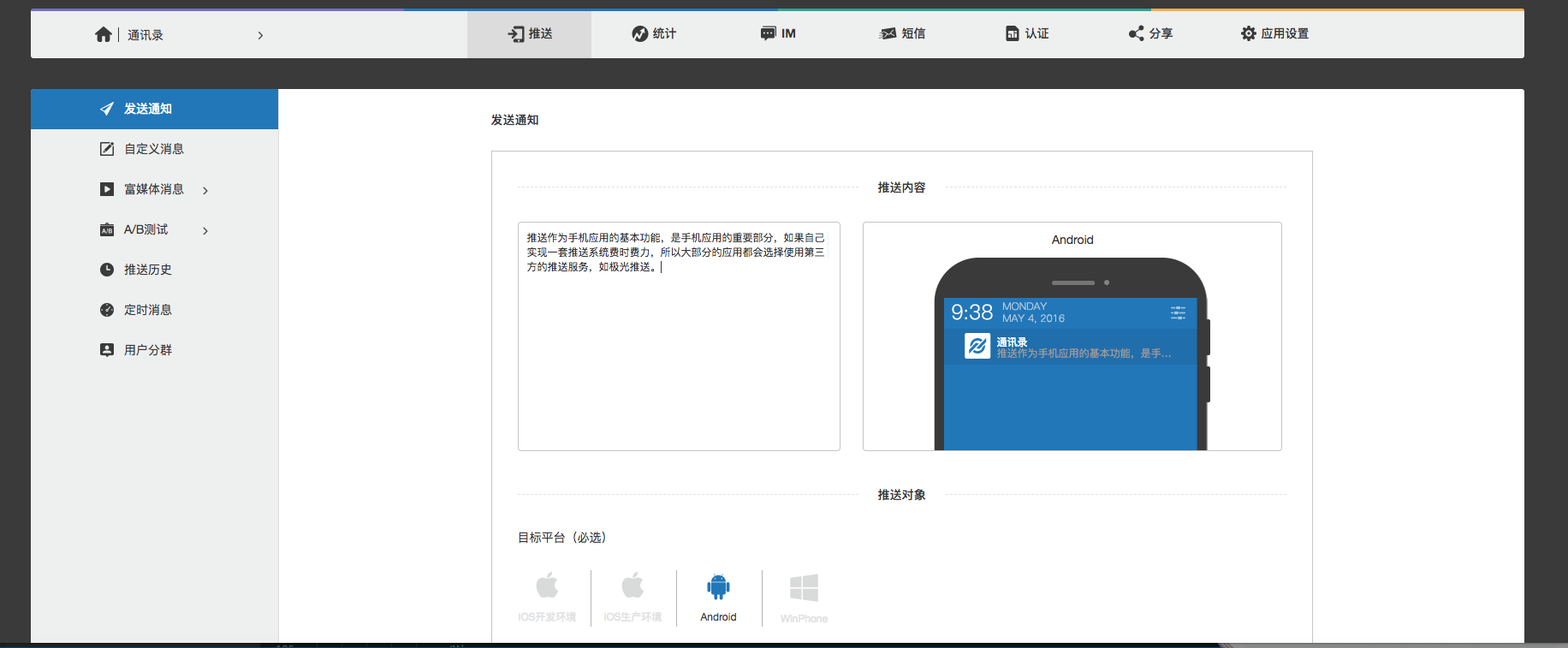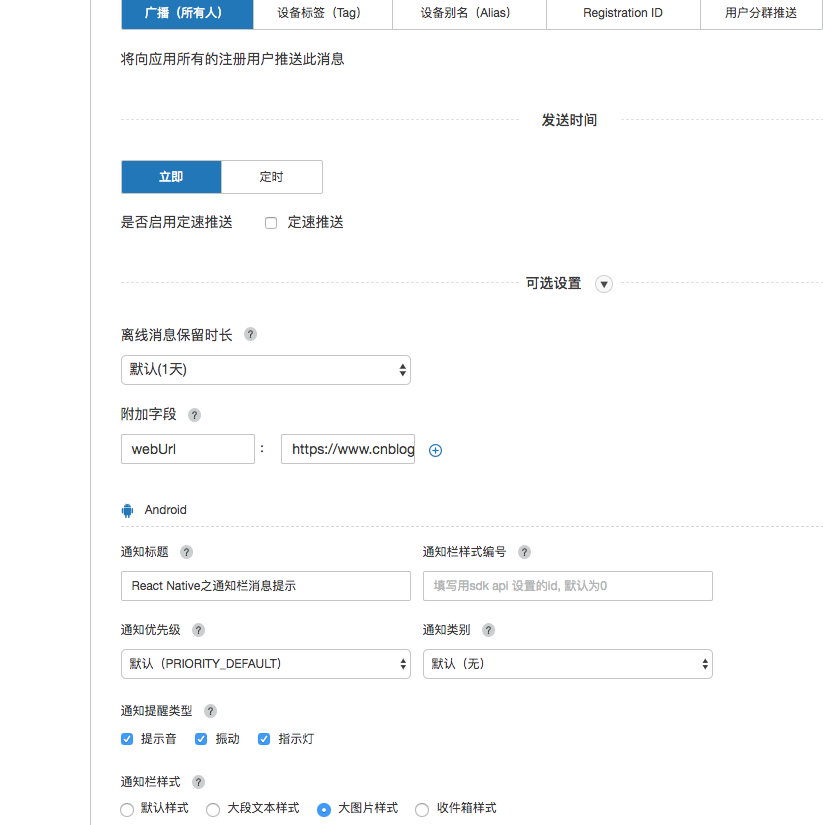React Native之通知栏消息提示(android)
一,需求分析与概述
1.1,推送作为手机应用的基本功能,是手机应用的重要部分,如果自己实现一套推送系统费时费力,所以大部分的应用都会选择使用第三方的推送服务,如极光推送。
1.2,jpush-react-native 是极光推送官方开发的 React Native 版本插件,可以快速集成推送功能。现在最新版本的 JPush SDK 分离了 JPush 及 JCore,让开发者可以分开集成 JMessage 及 JPush(以前 JMessage 包含了 JPush)。
API:
1 #初始化JPush 必须先初始化才能执行其他操作(only android) 2 initPush 3 4 getInfo 5 6 #执行该方法后,无法接收到通知 7 stopPush 8 9 #stopPush后,执行该方法,可接收通知(only android) 10 resumePush 11 12 #参数是func,func的参数是registrationId 13 getRegistrationID 14 15 #设置标签 16 setTags 17 18 #添加标签 19 addTags 20 21 #删除标签 22 deleteTags 23 24 #检查标签的状态 25 checkTagBindState 26 27 #清除所有标签 28 cleanTags 29 30 #设置别名 31 setAlias 32 33 #删除别名 34 deleteAlias 35 36 #获取别名 37 getAlias 38 39 #通知栏样式:Basic 40 setStyleBasic 41 42 #通知栏样式:Custom 43 setStyleCustom
1.3,推送通知可以及时地提醒用户.
二,极光推送注册与集成
2.1,注册
首先,登录极光官网系统,如果还没有账号可以注册一个,登录成功我们就可以创建和管理我们的应用了。

2.2,集成(android)
第一步:安装
打开终端,进入项目根目录文件夹下,执行以下命令:
1 npm install jpush-react-native --save 2 jpush-react-native 1.4.2 版本以后需要同时安装 jcore-react-native 3 npm install jcore-react-native --save
第二步:配置
自动关联配置
1 # 针对性的link,避免之前手动配置的其它插件重复配置造成报错 2 react-native link jpush-react-native 3 react-native link jcore-react-native
执行完 link 项目后可能会出现报错,这没关系,需要手动配置一下 build.gradle 文件。如自动配置没有成功或没有完善,可根据手动配置检查
手动配置
(1),检查 android 项目下的 settings.gradle 配置有没有包含以下内容(project/android/settings.gradle):
1 include ':jcore-react-native' 2 project(':jcore-react-native').projectDir = new File(rootProject.projectDir, '../node_modules/jcore-react-native/android') 3 4 include ':jpush-react-native' 5 project(':jpush-react-native').projectDir = new File(rootProject.projectDir, '../node_modules/jpush-react-native/android')
(2),project/android/app/build.gradle:
1 android { 2 ... 3 defaultConfig { 4 applicationId "yourApplicationId" // 此处改成你在极光官网上申请应用时填写的包名 5 ... 6 manifestPlaceholders = [ 7 JPUSH_APPKEY: "yourAppKey", //在此替换你极光官网上申请的 APPKey 8 APP_CHANNEL: "developer-default" //应用渠道号, 默认即可 9 ] 10 } 11 } 12 ... 13 dependencies { 14 compile project(':jpush-react-native') // 添加 jpush 依赖 15 compile project(':jcore-react-native') // 添加 jcore 依赖 16 compile fileTree(dir: "libs", include: ["*.jar"]) 17 compile "com.android.support:appcompat-v7:23.0.1" 18 compile "com.facebook.react:react-native:+" // From node_modules 19 }
(3),检查一下 app 下的 AndroidManifest 配置,有没有增加 <meta-data> 部分。 project/android/app/src/main/AndroidManifest.xml:
1 <application 2 ... 3 <!-- Required . Enable it you can get statistics data with channel --> 4 <meta-data android:name="JPUSH_CHANNEL" android:value="${APP_CHANNEL}"/> 5 <meta-data android:name="JPUSH_APPKEY" android:value="${JPUSH_APPKEY}"/> 6 7 </application>
(4),打开 project/android/app/src/main/java/com/项目名/下的 MainApplication.java 文件,然后加入 JPushPackage
1 ... 2 3 import com.rt2zz.reactnativecontacts.ReactNativeContacts; 4 import cn.jpush.reactnativejpush.JPushPackage; 5 6 ... 7 8 public class MainApplication extends Application implements ReactApplication { 9 // 设置为 true 将不会弹出 toast 10 private boolean SHUTDOWN_TOAST = false; 11 // 设置为 true 将不会打印 log 12 private boolean SHUTDOWN_LOG = false; 13 private final ReactNativeHost mReactNativeHost = new ReactNativeHost(this) { 14 @Override 15 public boolean getUseDeveloperSupport() { 16 return BuildConfig.DEBUG; 17 } 18 19 @Override 20 protected List<ReactPackage> getPackages() { 21 return Arrays.<ReactPackage>asList( 22 new MainReactPackage(), 23 new JPushPackage(SHUTDOWN_TOAST, SHUTDOWN_LOG) 24 ); 25 } 26 27 ... 28 29 }
(5),打开 project/android/app/src/main/java/com/项目名/下的MainActivity.java 文件,然后加入 如下代码:
1 ... 2 3 4 import android.os.Bundle; 5 import com.facebook.react.ReactActivity; 6 import cn.jpush.android.api.JPushInterface; 7 8 public class MainActivity extends ReactActivity { 9 10 ... 11 12 @Override 13 protected void onCreate(Bundle savedInstanceState) { 14 super.onCreate(savedInstanceState); 15 JPushInterface.init(this); 16 } 17 18 @Override 19 protected void onPause() { 20 super.onPause(); 21 JPushInterface.onPause(this); 22 } 23 24 @Override 25 protected void onResume() { 26 super.onResume(); 27 JPushInterface.onResume(this); 28 } 29 30 @Override 31 protected void onDestroy() { 32 super.onDestroy(); 33 } 34 }
(6),打开 project/android/app/src/main/下的AndroidManifest.xml 文件,然后添加访问通知的权限:
1 <!--添加通知权限,${ApplicationID}替换成你的applicationID!--> 2 <premission 3 android:name="${ApplicationID}.permission.JPUSH_MESSAGE" 4 android:protectionLevel="signature"/>
这样就基本完成了所有的配置。接下来就可以在 JS 中调用插件提供的 API 了。
三,使用与实现
3.1,使用
(1),在js中 1 import React, { PureComponent } from 'react';
2 import { 3 Linking, 4 Alert 5 } from 'react-native'; 6 import JPushModule from 'jpush-react-native' 7 8 ... 9 10 11 componentDidMount() { 12 /****************************通知 start **************************************************/ 13 if (Platform.OS === 'android') { 14 JPushModule.initPush() 15 // 新版本必需写回调函数 16 JPushModule.notifyJSDidLoad(resultCode => { 17 if (resultCode === 0) { 18 } 19 }) 20 } else { 21 JPushModule.setupPush() 22 } 23 // 接收自定义消息 24 this.receiveCustomMsgListener = map => { 25 this.setState({ 26 pushMsg: map.content 27 }) 28 console.log('extras: ' + map.extras) 29 } 30 31 // 接收自定义消息JPushModule.addReceiveCustomMsgListener(this.receiveCustomMsgListener) 32 this.receiveNotificationListener = map => { 33 console.log('alertContent: ' + map.alertContent) 34 console.log('extras: ' + map.extras) 35 } 36 // 接收推送通知 37 JPushModule.addReceiveNotificationListener(this.receiveNotificationListener) 38 // 打开通知 39 this.openNotificationListener = map => { 40 // console.log('Opening notification!') 41 // console.log('map.extra: ' + map.extras) 42 let webUrl= JSON.parse(map.extras).webUrl 43 let url = webUrl.replace(new RegExp("/", 'g'), "/") 44 Linking.canOpenURL(url).then(supported => { 45 if (!supported) { 46 Alert.alert('您的系统不支持打开浏览器!') 47 } else { 48 return Linking.openURL(url); 49 } 50 }).catch(err => { }); 51 52 } 53 JPushModule.addReceiveOpenNotificationListener(this.openNotificationListener) 54 55 // this.getRegistrationIdListener = registrationId => { 56 // console.log('Device register succeed, registrationId ' + registrationId) 57 // } 58 // JPushModule.addGetRegistrationIdListener(this.getRegistrationIdListener) 59 /****************************通知 end **************************************************/ 60 61 62 } 63 componentWillUnmount() { 64 JPushModule.removeReceiveCustomMsgListener(this.receiveCustomMsgListener) 65 JPushModule.removeReceiveNotificationListener(this.receiveNotificationListener) 66 JPushModule.removeReceiveOpenNotificationListener(this.openNotificationListener) 67 // JPushModule.removeGetRegistrationIdListener(this.getRegistrationIdListener) 68 // console.log('Will clear all notifications') 69 // JPushModule.clearAllNotifications() 70 } 71 72 } 73 74 ...
(2),在极光官网上推送

3.2,实现的效果

问题:
1,真机没接收到通知
解决:打开node_modules/jpush_react-native/android/src/AndroidManifest.xml,将所有的${applicationId}替换成你的包名。或将project/android/src/AndroidManifest.xml,的${applicationId}替换成你的包名。
... <application android:name=".MainApplication" android:allowBackup="true" android:icon="@drawable/ic_launcher" android:label="@string/app_name" android:theme="@style/AppTheme"> <activity android:name=".MainActivity" android:configChanges="keyboard|keyboardHidden|orientation|screenSize" android:label="@string/app_name"> <intent-filter> <action android:name="android.intent.action.MAIN" /> <category android:name="android.intent.category.LAUNCHER" /> </intent-filter> </activity> ... <!-- Required . Enable it you can get statistics data with channel --> <meta-data android:name="JPUSH_CHANNEL" android:value="${APP_CHANNEL}"/> <meta-data android:name="JPUSH_APPKEY" android:value="${JPUSH_APPKEY}"/> </application>
在.MainApplication和.MainActivity前添加包名

